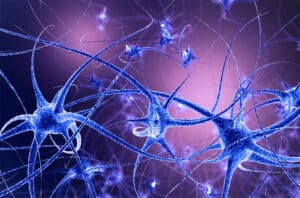Schizophrenia is a chronic and severe psychiatric disorder that requires lifelong treatment. While schizophrenia does not have a cure, the most common and successful method of treating and managing symptoms has historically been a combination of antipsychotic medications and psychotherapy. However, this treatment regimen has limitations. While antipsychotic medications are widely available and can be effective in lessening the severity of hallucinations and delusions in some patients, not all patients will respond to them, and they are not effective at treating cognitive symptoms of schizophrenia, such as thought disorder. This treatment gap has led to the search for new therapies, and a recent study published in Biological Psychiatry has identified calcium signaling as a promising target for developing new therapies for schizophrenia.
Schizophrenia Symptoms
Schizophrenia is a serious psychiatric disorder that affects around 1 percent of the general population. Schizophrenia causes an abnormal interpretation of reality, and generally involves a combination of symptoms that affect different aspects of cognition, perception, and behavior. Symptoms of schizophrenia can be divided into two categories: positive symptoms and negative symptoms.
Common positive symptoms of schizophrenia include auditory and visual hallucinations, delusions, disordered thinking and speech, and abnormal motor behaviors.
Negative symptoms describe a reduced or absent ability to function normally, and may present as social withdrawal, lack of motivation, lack of interest in everyday activities, neglecting hygiene, flat affect, and difficulties with attention and memory.
Current Treatment Options
Schizophrenia is a lifelong condition. The severity, duration, and presentation of symptoms may ebb and flow over time, but ongoing treatment is required even in times of symptom remission. Early diagnosis and treatment are thought to be important factors in controlling symptoms and lessening the likelihood of more serious long-term complications down the road.
The current treatment options for schizophrenia mainly consist of antipsychotic medications that target dopamine receptors in the brain. While these medications can reduce the severity and frequency of some symptoms, they can also cause a range of unwanted side effects, such as sedation, weight gain, and movement disorders. These side effects may limit some patients’ willingness to consistently cooperate with treatment.
Additionally, while in some patients, antipsychotics can be effective in reducing positive symptoms such as hallucinations and delusions, they often have limited efficacy for treating negative symptoms and cognitive deficits. As such, there exists a significant need to develop new and more effective treatment options.
New Potential Therapeutic Target Identified
Recent research published in Biological Psychiatry may represent an important step forward in the process of developing new therapies using induced pluripotent stem cells (iPSCs). As Cedars Sinai puts it, “Think of pluripotent stem cells as master cells capable of maturing into any human cell they want.” This can include neurons.
The study, conducted by a team of researchers at Northwestern Medicine, used iPSCs to generate human neurons from patients with a rare form of schizophrenia that contains the 16p11.2 duplication mutation, one of the most prominent genetic risk factors for schizophrenia. The team compared the neuronal networks from patients with the mutation to those from healthy individuals and found that calcium signaling, a key process in which neurons communicate, functions abnormally in the brain cells of patients with schizophrenia.
The researchers believe that targeting calcium signaling in neurons represents a promising therapeutic approach for treating this genetic form of schizophrenia. The use of iPSCs to generate human neurons may also provide a new way to screen for novel drugs to treat other forms of schizophrenia and other neurological disorders.
Scantox is a part of Scantox, a GLP/GCP-compliant contract research organization (CRO) delivering the highest grade of Discovery, Regulatory Toxicology and CMC/Analytical services since 1977. Scantox focuses on preclinical studies related to central nervous system (CNS) diseases, rare diseases, and mental disorders. With highly predictive disease models available on site and unparalleled preclinical experience, Scantox can handle most CNS drug development needs for biopharmaceutical companies of all sizes. For more information about Scantox, visit www.scantox.com.










